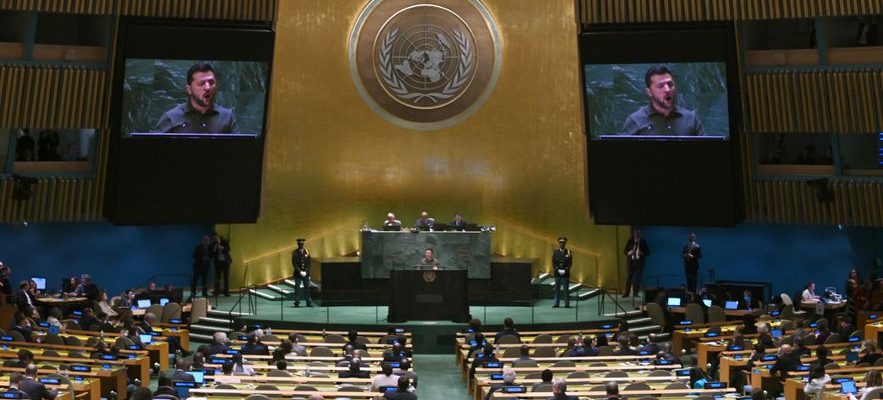What could Benjamin Netanyahu and Volodymyr Zelensky say to each other? In the midst of a counter-offensive, the Israeli and Ukrainian leaders met for the first time on Tuesday, September 19, on the sidelines of the UN General Assembly in New York. Since the start of the Russian invasion, Serge Gainsbourg’s tune, “Je t’aime, moi non plus”, could sum up the ambiguous relationship between Ukraine and Israel. Benjamin Netanyahu, like his recent predecessors as Prime Minister, Yaïr Lapid and Naftali Bennett, has always refused to go to Kiev, despite multiple invitations from President Zelensky, of Jewish faith. Ukrainian officials, for their part, have repeatedly criticized what they consider to be a lack of support.
Officially, the Israeli authorities remain on a very cautious line towards Ukraine, neutrality prevailing over a natural sympathy towards the Ukrainian cause. They oppose the delivery of weapons to the Ukrainians, despite calls to receive proven Israeli anti-aircraft defenses, such as the famous Iron Dome. They also refuse to apply sanctions against Russia, unlike the West. However, they provide other aid, not just humanitarian, via its secret services, as the warm embrace at the UN from Volodymyr Zelensky and the head of the Mossad, David Barnea, seems to support.
As for military technologies, an Israeli civilian alert system – non-lethal – should nevertheless be deployed in Ukraine in October, a year after the delivery promise. Very little official aid, for some: “I am ashamed of my government’s policies, does not hesitate to proclaim Sarah Fainberg, research director at the Elrom research center of the Israeli Air Force, attached to the Tel Aviv University. He is making a strategic error and lacks a long-term outlook, when he would have a great interest in helping Ukraine, where I saw a positive vision of Israel, with a great expectation to develop cooperation.”
Several reasons keep the Israeli authorities from joining the Western camp. The first is due to Russia’s presence in Syria, in support of the regime of Bashar al-Assad, where it has control of the sky via its S400 anti-aircraft system. “Since 2016, discussions with Moscow have taken place so that Israeli planes bombing targets on Syrian territory are not shot down,” explains Daniel Rakov, specialist on Russia in the Middle East at the Institute for Security and Safety. Jerusalem strategy. This agreement, called the “deconfliction mechanism”, if it stalls, risks limiting the possibilities of strikes against the Shiite militias of Iran or its Lebanese ally Hezbollah.
Between Iran and Russia, a complex relationship
“The challenge would be political and strategic,” says Air Force reserve colonel and strategist Ron Tira, a specialist in military affairs. Because a confrontation with Russia in Syria would not be a major military challenge for Israel. the Russian presence there being restricted and a large part of its equipment outdated” This would not be in Russia’s interest either: “What we do in Syria is beneficial to it, because it does not want Iran to be there too strong,” explains an Israeli specialist in the Russian world who requests anonymity.
Ukrainian President Volodymyr Zelensky addresses the UN General Assembly in New York on September 19, 2023
© / afp.com/TIMOTHY A. CLARY
The relationship between Russia and Iran, with variable geometry, is complex. Tehran provided Shahed suicide drones to Moscow to strike Ukraine, allowing it to also manufacture its own. This cooperation, to the great displeasure of Israel, also goes the other way, with the promise of delivering SU-35 combat planes to the mullahs’ regime. For the moment, only training aircraft, Yak-130s, have been provided. “The relationship is purely instrumental between the Russians and the Iranians,” said another expert. “In the eyes of the Russians, the Iranians remain junior partners and it is not certain that they get everything they want.”
Another reason for Israeli neutrality is the Jewish populations in Russia (more than 150,000 people). “The authorities want flights to be maintained with Israel,” remarks Daniel Rakov. “There is also the fear that anti-Semitism will increase in Russia.” The chief rabbi of Moscow, who went into exile to denounce the invasion of Ukraine, spoke of “dark clouds on the horizon”. In 2022, Moscow threatened to close the Jewish Agency, responsible for immigration to Israel, during the handover as head of government between Naftali Bennett and his successor Yaïr Lapid, more critical of the war led by the Kremlin.
The government’s hesitations can also be linked to public opinion, in a country marked by the immigration of more than a million and a half Russian speakers from the former USSR, starting in the 1990s. If 33% of Israelis call to “fully support Ukraine and join the position of the liberal democratic world”, according to a recent poll by the Mitvim institute, 44% of them want their country to “avoid taking sides so as not to irritate Russia, even if it displeases the West” (20% “don’t know” and 3% want “full support” for Russia). Faced with the war in Ukraine, the strategy of caution should remain somewhat still the one favored by the government.
